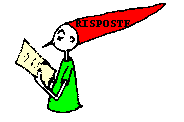Gli artisti e i poeti a volte inseriscono "errori grammaticali" nei loro versi perché "suonano meglio". Nei versi della canzone seguente c'è un interessante errore.
Puoi trovarlo? |
Artists and poets sometimes insert "grammatical mistakes" into their verses because they "sound better". In the lyrics of the following song there is an interesting mistake.
Can you spot it? |
|---|

Quando trovi un errore
Share this activity:
In questa attività presentiamo un successo musicale di Giorgia, una cantante italiana molto amata.
L'errore che devi trovare riguarda l'uso dei superlativi. La lingua italiana ha due forme di superlativo: relativo (es.: il più intelligente) e assoluto (es.: intelligentissimo). Rivedi i superlativi.
|
In this activity we introduce a music hit by Giorgia, a much loved Italian singer.
The mistake you have to find is about the use of superlatives. The Italian language has two forms of superlative: the relativo (e.g. il più intelligente = the most intelligent) and the absolute (e.g. intelligentissimo = very intelligent.) Review the superlative. |
|---|---|
Nella canzone ci sono anche degli ottimi esempi di uso dei tempi verbali: presente, imperfetto e passato prossimo.
Quando usa il presente, Giorgia ci parla della situazione attuale, mentre con il passato prossimo ci parla di azioni che sono accadute e con l'imperfetto ci descrive una situazione abituale nel passato. |
In Giorgia's song there are also very good examples of how to use the verb tenses: present, imperfect and passato prossimo.
When using the present, Giorgia talks about the current situation, with the passato prossimo she talks about actions that have happened in the past, and with the imperfetto she describes a recurring situation in the past. |
| Il passato prossimo (passato recente) viene usato per esprimere un'azione iniziata e completata nel passato (ieri ho mangiato la mela). Rivedi il passato prossimo. | The "passato prossimo" (recent-past tense) is used to express an action that began and was completed in the past (I ate the apple, I did eat the apple, I have eaten the apple.) Review the passato prossimo. |
| L'imperfetto (tempo descrittivo-passato) viene utilizzato per esprimere un'abitudine o un'azione che è stata spesso ripetuta (da bambino andavo alla spiaggia tutti i giorni), o per descrivere una situazione nel passato (quando vivevo a Roma...) Rivedi l'imperfetto. | The imperfect (descriptive-past) is used to express a habit or action that has often been repeated (as a child I went to the beach every day), or to describe a situation in the past (when I was living in Rome...) Review the imperfetto. |
| Ascolta la canzone, apri il PDF con i testi, scrivi i verbi mancanti e trova l'errore. | Listen to the song, open the PDF with the lyrics, write the missing verbs and spot the mistake. |
| Usa il dizionario se necessario. | Use the dictionary if you need. |
|---|
1. Ascolta la canzone.
2. Visualizza e/o stampa il PDF con le frasi della canzone per completare l'esercizio: ![]()
Coniuga i verbi al passato prossimo e imperfetto e trova l'errore nel testo. (Clicca sul Pinocchio-Risposte in fondo alla pagina per la soluzione).
This video is additional reference material and is not property of CyberItalian.
Should you have any problem viewing it, please notify us.
Thank you for your patience and collaboration!









